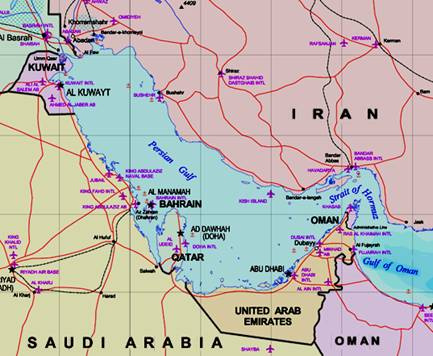Iran will not close the Strait of Hormuz

The Strait of Hormuz is situated in such a way that very big oil tankers are also able to pass through it. This is a very significant capability. If we look at the Persian Gulf's oil exporting countries, we can see that these countries have no choice but to move their oil through the Strait of Hormuz to be able to reach their destinations. Statistics show that Saudi Arabia's oil production capacity is currently about ten million barrels a day and it exports close to 7.5 to 8 million barrels of oil every day. The amount of Saudi dependence on the Strait of Hormuz is about 3.1 million barrels a day. Iraq's oil production capacity is three million barrels and its exports are 2.4 million barrels and about 1.7 million barrels are passed through the Strait of Hormuz. The UAE has an oil production capacity of 2.7 million barrels, exports of 2 million barrels, and its dependence on the Strait of Hormuz is 680 thousand barrels daily. Kuwait's oil production capacity is 2.5 million barrels and it exports 2.1 million barrels of oil. This country almost completely depends on the Strait of Hormuz for its oil transfer. The country of Qatar has an oil production capacity of 1.6 million barrels daily and it exports 1.4 million barrels of oil, the totality of which has to pass through the Strait of Hormuz.
What has happened is that the UAE has constructed a 370 km pipeline from Habashan to Fujairah. In fact, through this measure, the UAE has cut its dependence on the Strait of Hormuz and gone around this strait. Despite this issue, 15.5 to 16 million barrels of oil still pass through the Strait of Hormuz every day. Let’s suppose that Saudi Arabia also follows the same path one day. Then, under the most optimistic conditions, 5 million barrels of oil will be reduced from the dependency of Persian Gulf littoral states on the Strait of Hormuz. 10 to 12 million barrels of oil will still pass through this strait every day.
I would like to speak to you from another point of view. Propaganda surrounding this issue has been more than the reality. Iran is responsible for the security of the Strait of Hormuz. Basically, no decision has been made for closure of this strait, for such a measure is not wise. Experience from the years of the Iran-Iraq war has shown that, despite Saddam's willingness to push war towards the Strait of Hormuz, Iran defended this strait and kept it open. Therefore, the Islamic Republic of Iran does not seek insecurity in the Strait of Hormuz. Of course, certain countries and governments intend to show that this region is insecure. But I believe that with the wisdom, intelligence, and management that exist in the country, efforts are made to keep this region safe and secure. Hence, any insecurity in the Strait of Hormuz will cause damage to the whole world.
It does not seem that the Islamic Republic of Iran would try to close the Strait of Hormuz. It seems rather that other countries try to create fear in the minds of consumers through false propaganda. Iran, as one of the world's energy producers, seeks the security of the energy intended for these consumers. But those countries sometimes create conditions that close all doors for the Islamic Republic of Iran. The situation then becomes completely different and decisions will be made by security and military officials. But under normal conditions, closure of the Strait of Hormuz is neither beneficial nor practical. My last word is that, even in the most pessimistic scenario, the strategic role of the Strait of Hormuz will not be reduced.

